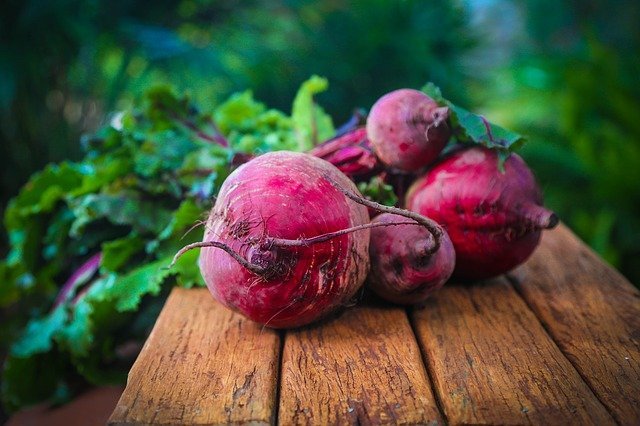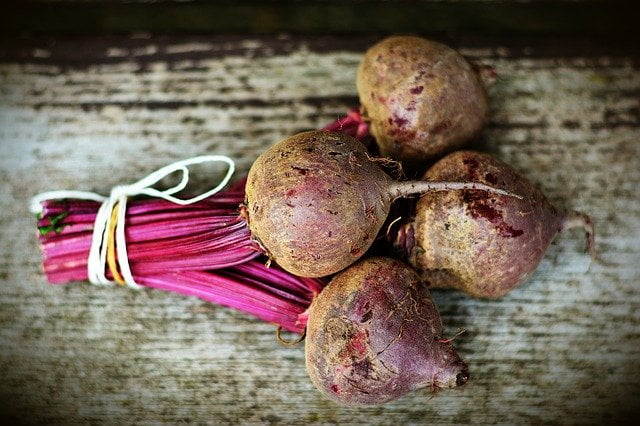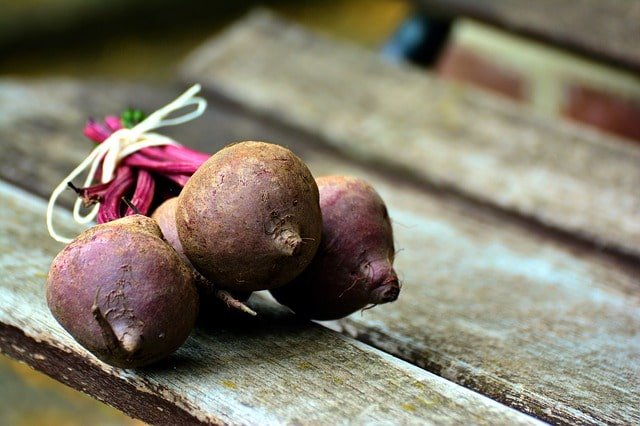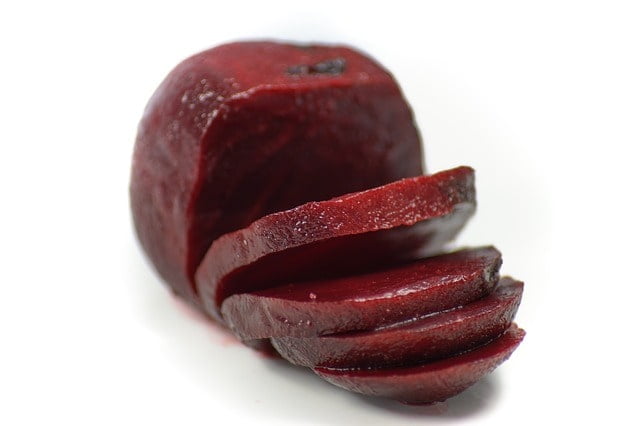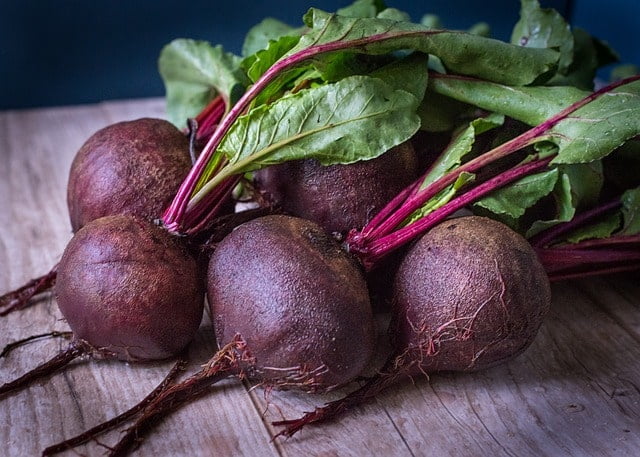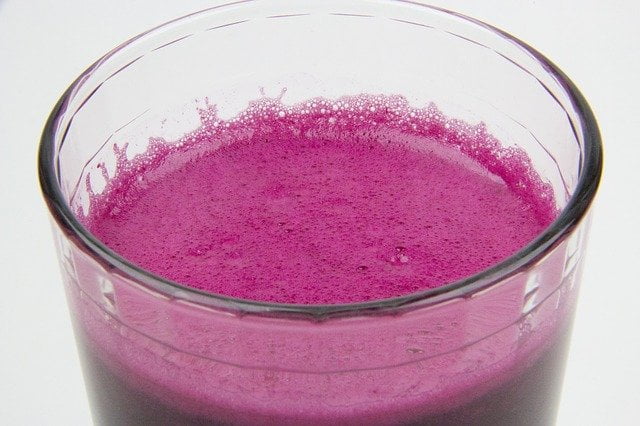What is Beetroot (Chukandar)?
Beetroot (Chukandar) is a well-known root vegetable that is utilized in a variety of various dishes and cuisines. It’s a nutrient-dense vegetable, with a deep, earthy taste. Another factor for beetroot’s appeal is the variety of methods to incorporate this vivid veggie into your diet.
The nutritional value of beetroot is difficult to match with almost any veggie! Many individuals rely on beetroots (chukandar) because it has many benefits as well as is good for health.
Actually, beetroot is the taproot portion of a beet plant and is also known by other names like garden beet, red beet, table beet, golden beet, dinner beet, and beet.
This vegetable is a good source of folate, iron, manganese, potassium, vitamin C, and fiber.
Beetroots have numerous types; many of them are distinguished by their color – white, dark purple, yellow, and pink.
These are delicious raw but also pickled or cooked.
Beetroots have numerous health benefits like lower blood pressure, increased stamina, improved blood flow, and protection from anemia.
What is the Nutritional Value of Beetroot (Chukandar)?
Beetroot is a nutritious powerhouse. Beets’ nutritional benefits much exceed most of the root veggies.
| Nutritional Value per 100 gram serving of boiled Beetroot (15) | |
| Energy | 44 Kcal |
| Water | 87.1 g |
| Carbohydrates | 9.96 g |
| Sugars | 7.96 g |
| Dietary fiber | 2 g |
| Protein | 1.68 g |
| Fat | 0.18 g |
| Minerals | |
| Sodium | 77 mg |
| Calcium | 16 mg |
| Potassium | 305 mg |
| Copper | 0.074 mg |
| Iron | 0.79 mg |
| Magnesium | 23 mg |
| Phosphorus | 38 mg |
| Zinc | 0.35 mg |
| Manganese | 0.326 mg |
| Vitamins | |
| Vitamin A | 2 mcg |
| Vitamin B1 (Thiamine) | 0.027 mg |
| Vitamin B2 (Riboflavin) | 0.04 mg |
| Vitamin B3 (Niacin) | 0.331 mg |
| Vitamin B5 (Pantothenic acid) | 0.145 mg |
| Folate | 80 mcg |
| Vitamin C | 3.6 mg |
| Vitamin E | 0.04 mg |
| Vitamin K | 0.2 mcg |
What are the 15 Uses and Health Benefits of Beetroot (Chukandar)?
15 uses and health benefits of Beetroot are as under:
1) Beetroot Increases Stamina
Various studies suggest that nitrates like those found in beetroots can improve physical performance.
These dietary nitrates have been shown to decrease oxygen use during exercise by affecting the efficiency of mitochondria, which are responsible for producing energy in cells (1).
Beetroot raises your body’s nitrates content, resulting in increased blood flow. It also enhances lung capacity, cardiorespiratory toughness, as well as helps make any activity or workout less exhausting, so it’s better for you.
2) Beetroots can Protect You From Anemia
As we all know that the deficiency of iron causes anemia.
Individuals with insufficient iron levels may occasionally develop anemia or iron deficiency.
Beets are high in iron, which is required for the formation of RBCs and hence protect you from anemia.
The folate present in beets also helps in preventing anemia.
3) Beetroot (Chukandar) Benefits For skin
Vitamin C is abundant in beets. Studies have shown that skin fibroblasts require this vitamin to synthesize collagen. Thus it softens your skin as well as defends against wrinkles. Vitamin C also helps to protect your skin from the harmful effects of UV radiation.
This veggie also contains vitamin A that helps to maintain healthy mucous membranes and benefits your skin health. This vitamin also helps in the daily replacement of your skin cells (5).
Therefore, the next time you’re going to purchase expensive skin care products, take a break and try beetroot (chukandar).
4) Beetroot (Chukandar) Helps in Reducing Blood Pressure
Numerous studies have demonstrated beetroot’s beneficial effects on blood pressure. If you eat beets or consume beetroot juice regularly, your blood pressure will go down within four weeks (2).
Whether raw, boiled, or baked, all forms of beets can help lower blood pressure.
Beets increase your body’s nitric oxide content, which relaxes your blood vessels thus lowering blood pressure.
5) Beetroot is Very Good For Digestion
If you frequently experience stomach problems, beetroot maybe your closest friend.
Beets are high in fiber and aid in regular bowel movements. It is said that beetroots are unparalleled in their ability to help digestion as well as accelerate metabolism.
Consuming beetroot (Chukandar) juice is by far the most efficient method of constipation relief.
6) It Contributes to The Fight Against Inflammation
Beetroot is beneficial for the body because it fights inflammation as well as protects the blood against toxic substances.
Not only are beetroots an excellent anti-inflammatory diet, but they also help avoid oxidative stress as well as help to boost your immune system.
7) Enhances Your Brain Functioning
Consuming raw beets as well as beet juice might help to increase blood flow to the brain. Nitrates can assist in increasing blood flow and may safeguard you from certain brain-related disorders.
The nitrates present in beetroot are converted into nitric oxide by the body. This nitric oxide helps brain cells to communicate with each other, thus enhancing brain health. These dietary nitrates also improve blood flow to the brain (3).
Beetroot juice also helps to prevent Alzheimer’s disease. Some studies have shown that people who regularly drank beets juice had improved cognitive functioning and healthier brains (4).
Thus, people who eat beets may be able to prevent dementia and may have improved cognitive abilities.
8) Beetroot Aids in Weight Loss
If you’re seeking good weight-loss meals, don’t forget to include beetroot!
It (chukandar) contains low calories as well as a lot of water. Each of these elements is essential for those attempting to reduce or maintain weight.
9) Beetroot (Chukandar) Assists in Detoxification
Beet juice is an excellent cleansing beverage for individuals of all ages!
Beetroot juice is packed with vitamins as well as minerals that aid in the body’s proper functionality. Its juice contains minerals like iron, zinc, potassium, etc. It also has a considerable amount of Vitamin C and calcium.
It disinfects and purifies your body from within and also enhances blood circulation.
10) It May Help to Control Blood Sugar Levels
Beetroots contain alpha-lipoic acid (ALA), an antioxidant, which may help to reduce blood glucose levels and increase insulin sensitivity.
In 2019 researchers looked at the effects of alpha-lipoic acid on the symptoms of diabetic neuropathy. They found that oral and intravenous administration of alpha-lipoic acid supplements can cause a decrease in symptoms of autonomic and peripheral neuropathy in diabetic patients (6).
According to a study conducted in the UK, the consumption of beetroot juice has been shown to suppress postprandial (after a meal) hyperglycemia (7).
11) Beetroot May Help to Prevent Osteoporosis
Yes, it’s right.
Friends, as you know that beets are rich in nitrates, which get converted into nitric oxide by the body. A study conducted in Japan showed that nitric oxide can help to prevent some lifestyle-related diseases, like osteoporosis (8).
Due to the presence of silicon in beetroot, it is considered good for the treatment of osteoporosis. This mineral is needed by the body to utilize calcium properly (9).
Thus eating beets or having a glass of its juice every day can help to keep osteoporosis at bay!
12) Beetroot May Help to Prevent Cataracts
Beets (mainly beet greens) contain a good amount of beta-carotene, which may help to decrease the risk of cataracts and also help in the prevention of age-related macular degeneration.
13) Beetroot May Aid Cancer Prevention
Beetroot contains several compounds with anti-cancer properties, including rutin, betaine, caffeic acid, ferulic acid, and kaempferol (10)
One other study has also shown that higher blood levels of betaine may be linked with a lower risk of developing cancer (11).
Along with carrot extract, Beetroot juice was found to help in the treatment of leukemia. Several studies have supported the anticancer properties of beetroots (12).
14) Beetroot is Rich in Nutrients But Low in Calories
This veggie boasts an impressive nutritional profile.
It is low in calories but high in many valuable vitamins and minerals.
Beetroot is rich in folate, which plays a main role in growth, development, and heart health.
It contains a good amount of manganese, which is required in bone formation, brain function, and nutrient metabolism,
Also, it is high in copper, which is required for the synthesis of certain neurotransmitters and energy production.
In fact, beets contain a bit of almost all of the minerals and vitamins your body requires.
Beet is also rich in polyphenols and betalains, which are the compounds that offer it antioxidant properties. These properties help to treat oxidative stress.
These antioxidants may improve the body’s antioxidant status.
15) It May Promote Liver Health
The presence of betaine, vitamin B complex, calcium, iron, and antioxidants retains beetroot among the best liver foods.
It contains pectin, which is a fiber that helps eliminate toxic heavy metals from the body (13).
The beets also contain zinc and copper, both of which can defend the liver cells from oxidative stress (14).
What are the Side effects of Beetroot (Chukandar)?
Friends, we’ve learned about the uses and health benefits of beetroot (chukandar). But this wonderful veggie has some side effects too; now let’s learn about beet’s negative effects (or side effects).
1) May Cause Kidney Problems
Beetroot has been reported to induce kidney problems in rare instances. People who have stones or who are at risk for stones should stay away from beetroot or beet greens because they could end up causing them some problems.
Beetroot (chukandar) has a significant amount of oxalate, which may contribute to the production of kidney stones for some persons.
2) May Cause Calcium Deficiency
Some studies have reported that beets may reduce calcium levels in the human body. Thus, it may have a negative effect on the bones.
3) Dangerous For People With Lower Blood Pressure
Although beetroot is good for those with high blood pressure, it can’t be true for individuals with lower blood pressure.
This veggie has elements that can help persons who suffer from hypertension.
Its ingestion can be highly detrimental to people who have lower blood pressure. So, if you are already suffering from hypotension, you should avoid eating beets on regular basis.
4) Beetroot Allergy
We have already known that beetroot is rich in minerals, vitamins, dietary fibers, polyphenols, and phytonutrients; the presence of these compounds makes it very beneficial for us.
But its consumption might cause allergic reactions in some people.
Beetroot is frequently associated with adverse responses such as skin rashes, chills, hives, itching, as well as fever.
Consuming beetroot juice causes the vocal cords to constrict, making swallowing more difficult for certain people. As a result, it is best to avoid beets for people who have allergies.
5) Beets May Cause Problems During Pregnancy
Due to the presence of numerous nutrients in beetroots, these are very beneficial during pregnancy. But the nitrates in this vegetable may cause a problem in pregnant women, as some are more sensitive to the effects of nitrate.
This may be due to the natural increase of methemoglobin levels in the blood during the later stage of pregnancy. Excess nitrate can cause methemoglobinemia, causing symptoms like headache, lack of energy, dizziness, blue-gray coloration of skin around the lips, eyes, hands, and feet.
Thus, it is recommended to eat beets in moderate amounts and that also only after consulting your doctor.
6) Gouts
Eating beetroot daily and in moderate amounts has been found to be very helpful for providing relief in inflammatory conditions like arthritis, gouts, etc.
But beets are rich in oxalates that contribute to the formation of excessive uric acid in your body.
And this large amount of uric acid is harmful to you because it leads to the formation of gout, which includes common symptoms like high fever, extreme joint pains, and shiny red joints.
Due to this reason, you should avoid eating beetroot in large amounts.
7) Beetroot Can Be Detrimental To The Liver
As previously said, beets are indeed an excellent source of iron, phosphorus, magnesium, and copper.
However, the concern is that they are metals; therefore high intakes of any of those can lead to accumulation. So, it may harm your liver and pancreas.
8) Beets May Cause Beeturia
Beeturia is because of over-consumption of beet or its juice.
It is a condition characterized by the discoloration of urine (color of urine may range from pink to deep red) following the consumption of beetroot. This condition can be prevalent in approximately 10 to 14% of the population and maybe more frequently present in those with iron deficiency (16).
For the majority of people suffering from beeturia, it happens to be a harmless phenomenon that resolves on its own after the individual decreases or stops the intake of beetroot or its juice (16).
What is the Dosage of Beetroot (Chukandar)?
Beets have various health benefits, but you can get these only when you consume this veggie in the proper dosage.
The dose of various beetroot forms is as under:
Beetroot Juice
There are still no formal dose guidelines for beet’s juice at the moment. Consuming 250 milliliters of its juice in a day may help decrease blood pressure.
The researchers noticed that beet juice’s capacity to reduce blood pressure is dependent just on nitrate content, which varies significantly amongst beetroot juices.
With around 0.1-0.2mmol/kg (6.4-12.8mg/kg) being the target for nitrate to reduce blood pressure in normal individuals.
You can take ½ to 1 cup of beetroot juice or as advised by your doctor.
Beetroot Oil
You can consume 4-5 drops of beet oil or as advised by your doctor.
Beetroot Powder
½ to 1 teaspoon or as advised by your family physician.
Beetroot Capsule
1 to 2 beetroot capsules twice a day.
How to use Beetroot (Chukandar)?
Friends, you can use beetroot for consumption in the following ways:
1) Salad Of Beetroots
- Begin with one to two raw beetroots.
- Wash then slice them into appropriate shape and size parts.
- Additionally, you can include your favourite vegetables.
- Add 12 lemon slices.
- Season with salt to taste.
- Consume this with or prior to meals.
2. Beetroot Juice
You can take 250 ml of Beetroot juice and add pomegranate or orange juice to it. Prefer to consume it in the morning.
3) Beetroot Powder
You can take ½ -1 teaspoon of Beetroot powder and swallow it with water. Prefer to consume it after meals.
4) Beetroot Capsule
You can eat 1-2 capsules of Beetroot with water after meals twice a day.
Apart from these beets can also be used in many other forms like pickled, roasted, etc.
Following are the ways by which you can use beets for external use:
1) Beetroot Juice
- Take 1-2 teaspoons of beetroot juice.
- Combine with honey and spread gently on your face.
- Allow 15 minutes to rest.
- Thoroughly clean with tap water.
- Repeat this procedure 2-3 times a week to keep wrinkles and blemishes at bay.
2) Beetroot Powder
- Combine 1-2 teaspoons of beetroot powder in a small bowl.
- Combine it with honey.
- Apply to the region that has been harmed.
- Allow the mixture to settle for twenty to thirty minutes.
- Rinse well with tap water.
- Repeat this procedure 2-3 times per week to get relieve from edema.
3) Beetroot Oil
- Add four to five drops to a little amount of water.
- Mix in sesame oil.
- Massage the afflicted region equally.
- Apply this treatment one to two times daily to alleviate pain.
Conclusion
Beetroot’s qualities make it a ‘superfood,’ and many health-conscious individuals swear by it. Beetroot nutrients and their benefits for the body can only be obtained by their consistent consumption and balance.
As we have seen above, Beetroot’s antioxidant qualities may aid in the prevention of cancer as well as liver damage. Beetroot is high in fiber, which could also aid with constipation treatment. Beetroots are a nutritious complement to the majority of diets.
Beets (Chukandar) can be consumed raw as well as cooked, or as a juice. Beet juice has a plethora of useful elements that the heating process might deplete. It’s crucial to remember that beets must not be consumed in excess.
———————————————
References:
1) Dietary inorganic nitrate improves mitochondrial efficiency in humans
https://pubmed.ncbi.nlm.nih.gov/21284982/
2) Dietary nitrate provides sustained blood pressure lowering in hypertensive patients
https://www.ncbi.nlm.nih.gov/pmc/articles/PMC4288952/
3) Acute effect of a high nitrate diet on brain perfusion in older adults
https://www.ncbi.nlm.nih.gov/pmc/articles/PMC3018552/
4) Daily dose of beet juice promotes brain health in older adults
https://www.sciencedaily.com/releases/2010/11/101102130957.htm
5) What is vitamin A and why do we need it?
https://www.ncbi.nlm.nih.gov/pmc/articles/PMC3936685/
6) Insights on the Use of α-Lipoic Acid for Therapeutic Purposes
https://www.ncbi.nlm.nih.gov/pmc/articles/PMC6723188/
7) Effects of a beetroot juice with high neobetanin content on the early-phase insulin response in healthy volunteers
https://www.ncbi.nlm.nih.gov/pmc/articles/PMC4153083/
8) NO-Rich Diet for Lifestyle-Related Diseases
https://www.ncbi.nlm.nih.gov/pmc/articles/PMC4488823/
9) Silicon as Versatile Player in Plant and Human Biology: Overlooked and Poorly Understood
https://www.ncbi.nlm.nih.gov/pmc/articles/PMC4641902/
10) Red Beetroot and Betalains as Cancer Chemopreventative Agents
https://www.ncbi.nlm.nih.gov/pmc/articles/PMC6515411/
11) Association of choline and betaine levels with cancer incidence and survival
https://pubmed.ncbi.nlm.nih.gov/29606601/
12) Beetroot-Carrot Juice Intake either Alone or in Combination with Antileukemic Drug ‘Chlorambucil’ As A Potential Treatment for Chronic Lymphocytic Leukemia
https://www.ncbi.nlm.nih.gov/pmc/articles/PMC4877878/
13) Evaluation of pectin binding of heavy metal ions in aqueous solutions
https://pubmed.ncbi.nlm.nih.gov/10204240/
14) Liver-protecting effects of table beet (Beta vulgaris var. rubra) during ischemia-reperfusion
https://pubmed.ncbi.nlm.nih.gov/17234508/
15) USDA Food Data Central
https://fdc.nal.usda.gov/fdc-app.html#/food-details/169146/nutrients
16) Beeturia
https://www.ncbi.nlm.nih.gov/books/NBK537012/
———————————————
Disclaimer: This article is intended for informational purposes only. Any information associated with this article should not be considered as a substitute for prescriptions suggested by local health care professionals.
———————————————
Recommended Articles:
1) Bananas: Calories, Nutrition Facts, & Health Benefits
———————————————
